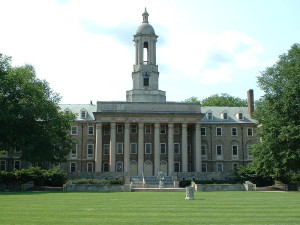Despite tensions over tables, Penn State speech policy checks out, professor says

By Andrew Staub | PA Independent
When Penn State University officials clamped down on a Young Americans for Freedom event about free-speech policies because of a table — on Constitution Day, no less — it looked like a battle over the First Amendment could be brewing.
Upon further review, Penn State’s policy isn’t unreasonable, even if it is a tad bureaucratic when it comes to tables.
The university drew national attention last month when officials told YAF that they couldn’t have their table at the event because the group had not obtained pre-approval, as required by Penn State’s policy governing expressive activity outdoors.
Chapter chairwoman Jolie Stuart-Davis told PA Independent at the time that she thought the university was just upset about YAF’s contention that school policy violated free-speech rights.
BUREAUCRATIC, BUT NOT BAD: Penn State’s policy on expressive activities outdoors is likely OK, even if it’s a tad bureaucratic when it comes to tables.
Donald Downs, director and co-founder of the University of Wisconsin’s Center for the Study of Liberal Democracy, said requiring advance notification for tables could be considered “reasonable” as long as the university isn’t heavy-handed about approving the structures.
“Tables are really an important part of student politics,” Downs said. “That’s a point that should be stressed.”
At the same time, a 2006 revision to the policy has actually further opened free speech on campus, said Downs, who reviewed Penn State’s policy and press clippings about it for PA Independent.
“It looks like they got their act in order here from what I’ve seen,” said Downs, who is also president of the Committee for Academic Freedom and Rights.
While Penn State once limited students to 12 designated public forums for larger protests and demonstrations, the university no longer requires that they use those spaces.
Instead, the policy acknowledges that other areas of campus can be used for expressive activity, too, as long as groups consult with the administrators in charge. Registered student organizations or groups of 10 or more may reserve locations, which would give them exclusive use of the space.
Groups of 10 or less people can use the designated public forums without reservation. Small groups and individuals also can use “any outdoor area open to the public” as long as the noise doesn’t interfere with university business and crowds don’t block entrances to facilities, according to the policy.
Lisa Powers, a spokeswoman for Penn State, said she was confident the school meets Constitutional obligations, but “like any other enterprise, must effect reasonable rules to manage and coordinate the many activities of its various constituents.”
“There is no right among students and others at this or any other public university more central to the mission of the institution than freedom of thought and expression,” Powers said.
Nadia Lehtihet, president of the Penn State College Democrats, said with more than 40,000 students, the campus can’t become a “free-for-all,” but noted that past policy changes eliminated the so-called free-speech zones. She said she believes YAF has misinterpreted the policy.
“They have been working to create this narrative that free speech on college campuses is somewhat restricted, when it really couldn’t be further from the truth,” she said.
Part of the exchange between school officials and YAF was caught on tape, and the officials told the group it could continue handing out its literature, it just couldn’t keep the table up outside the student union building.
Brandon Matsnev, president of the Penn State College Republicans, said his group recently encountered problems with a table at a voter registration event. He said he doesn’t think the university wants to crack down on free speech, but he also doesn’t think the policy makes much sense.
“I don’t think there are any ulterior motives or anything like that, but I would make things easier for students,” he said.
Downs said the university could simply exempt tables.
While the YAF incident might boil down to just an issue with a table, that’s not to say other universities haven’t gone too far with their policies.
Texas Tech University once required that students make public speeches in its infamous free-speech gazebo — a 20-foot-in-diameter structure on the 1,839-acre campus.
Modesto Junior College in California stopped a student from distributing copies of the Constitution on Constitution Day, saying he had to reserve a designated free-speech zone that was unavailable that day.
And, before a federal judge struck down the policy, the University of Cincinnati forced students to register 10 working days in advance to use a tiny free-speech zone.
“The important thing to remember about free-speech zones is that they quarantine free speech to small areas of campus as though it were a disease instead of a benefit to the a campus,” said Robert Shibley, the senior vice president at the Foundation for Individual Rights in Education, which has fought against free-speech zones.
And while Penn State’s policy might check out, Downs said he tends to be wary of any policy that zones free speech.
“Given the sort of history and the background of campus policies on free speech over the past 30 years, I’m suspicious of these kinds of restrictions,” he said. “The burden is on the university to show why they’re necessary.”
Andrew Staub is a reporter for PA Independent and can be reached at Andrew@PAIndependent.com. Follow @PAIndependent on Twitter for more.







